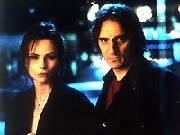|
|
||||
|
|
by Donald Levit  Billed as Finding Happiness but more frequently as Happiness for Free (La felicita non costa niente), Mimmo Calopresti's fourth picture is among the latest in a venerable line to deal with mental illnesses, recently including Revolution #9 and Spider -- not the mad scientist or love- or revenge-crazed stalker but, rather, the truly ill, clinically treatable only in some cases. Here, the memories of a number of characters begin as (often interior) monologue voice-overs, which so imperceptibly blend into visual scenes that we do not notice they are actually remembrances of the past. This effective technique embraces the unspoken thoughts of central figure Sergio (Calopresti), severely head-butted and kicked by an irate, obscene neighbor immediately after opening credits. Near the end of the film though relatively soon in chronological plot-time, we realize that much of the story reoccurs in his head as doctors frantically anaesthetize him to repair a hemorrhaging liver. Others are puzzled, "intrigued and worried," even as the architect proclaims the freedom and honesty of new life. Vague apprehensions stir underneath, of drowning without reaching the surface, but he stops talking to a psychoanalyst. Following a troubling and alienating visit to his parents in Turin, sexual hunger compels him to the streets of Rome, where he saves from suicide a beautiful, improbably elegant woman (Francesca Neri). Their idyll suggests love as a remedy, but she proves more dangerously delusional than he. A resultant search goes through the Church and a socially oriented convent, but unsure faith brings no solace. The votive candle, too, is blown out. Underlined against an ironic score buoyed around an uptempo "What a Wonderful World," existence spins wildly and leads to the beating and hospitalization. As his ex-wife (Fabrizia Sacchi) and former business partner-best buddy (Vincent Perez) comfort one another and reminisce during the surgery, a hokey explanation for guilt feelings and silly vision of that pretentious spirit Gianni dressed up at a workers' picnic-paradise, make for an unconvincing resolution. Nor is there satisfaction in Sergio's actual, imagined or postmortem presence at his son's balloon-decorated roof party. Yet this doubly unwise ending should not diminish an excellent portrayal of unexpected, isolating free fall into mental hell. Cleverly melding a variety of viewpoints but not tipping its hand early, making good use of backdrop statues, parks, cityscapes and interior décor, with well-timed cuts and switching between the imaginary and real worlds, the effort convinces even if it cannot answer. Then again, who or what can? ( Screening at Lincoln Center in June, 2003, as part of the Film Society's "New Italian Film" program. Released by Lucky Red; not rated by MPAA.) |
||
|
© 2026 - ReelTalk Movie Reviews Website designed by Dot Pitch Studios, LLC |



